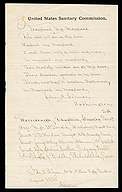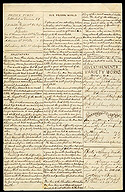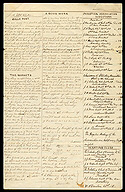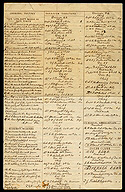| ||||
The William Oland Bourne collection in the New-York Historical Society's Manuscripts Department includes correspondence, papers, broadsides, and unpublished manuscripts related to his work as a social reformer, editor and author in New York City during the 1850s and 60s. Through his publication, The Soldier's Friend, he sought to aid disabled soldiers by offering prizes to those who had lost their right arms in combat during the Civil War and had learned to write with their left hands. It is the material relating to this enterprise that was selected from the collection for digitization. The selection includes letters, photographs and papers regarding the competition sponsored by Bourne's publication, The Soldier's Friend, for best specimens of left-handed penmanship by disabled soldiers. A draft of the requirements and a circular calling for submissions describe the purpose and requirements of the competition. There are 16 letters (1865-8) to Bourne from disabled soldiers, four of whom included photographs. A report of the prize committee lists the names of the winners of premiums.
Among the notable letters is one from Joe W. Mersereau of New York, dated April 24, 1865, offering a specimen of penmanship with an artificial arm manufactured by the National Leg and Arm Company. Phineas P. Whitehouse's letter of April 27, 1865 describes how he became proficient in writing with his left hand after losing his right arm a little less than a year before. John A. Lehman of Washington, D. C. states in his letter of April 30, 1866 that he lost his right arm at the Battle of Antietam, September 17, 1862. A brief letter from Alvin Blood of Stevens Point, Wisconsin asks only what premium his writing would draw. |
| ||||||||
|
The Prison Times, volume 1, no. 1, Fort Delaware, April 1865, consists of 4 unnumbered folio pages, handwritten in ink. This first, and only, edition of the Prison Times was produced by Confederate prisoners at the Fort Delaware Federal prison camp on Pea Patch Island, Delaware. Each page is divided into three columns, with a serious (if tongue-in-cheek) attempt made to follow the standard newspaper format of the time. For example, "advertisements" appear on the first page, right column, and similarly on the second page. These are apparently for genuine services, such as "tailoring," and "washing and ironing," offered by named members of particular divisions in the prison camp. The other columns on the first page are titled "Our Paper" and "Miscellaneous." The second page has a masthead, "Salutatory," and "Our Prison World." On the third page are "Local," "A Good Work," "Christian Association Directory," and "Debating Clubs. The last page includes "Original Poetry" and "Barracks Directory."
The motto of the newspaper, under an image of a clock showing five minutes past six, is En temps et lieu (literally, "in time and place"), positioned with the paper's title on the first page. Edward R. Rich, who had been a prisoner at Fort Delaware, wrote about this newspaper in his Civil War memoir, Comrades! : "One of the most remarkable productions of Fort Delaware was the Prison Times, a newspaper published in April, 1865, by Capt. Geo. S. Thomas, 64th Georgia Regiment, and Lieut. A. Harris, 32d Florida. It was written in a small but very clear handwriting by Capt. J. W. Hibbs, of the 13th Virginia Cavalry [sic], who proved himself a most expert penman." 1 The editorial staff made it plain (on page 2 in the section headed "Salutatory" in the left-hand column) that they hoped the paper would be a short-lived enterprise:
"Trusting that the difficulties of conducting an enterprise of this kind under the circumstances are duly appreciated by an intelligent public, we send forth this our first number hoping that ere we can have time to issue many numbers our prison times will be discontinued forever and our patrons and ourselves be far away in our loved Sunny South." Indeed, Rich confirms that: "Prison Times, Vol. 1, No. 1 died almost as soon as it was born, for the ink was scarcely dry on its pages ere the news of Lee's surrender, reached Fort Delaware, and with the hopes of a speedy parole, the publication of the paper was suspended. It had, indeed, a short life; but it was full of interest to its readers, and should anyone whose eye glances over these pages have a copy of it, they will surely prize it as a treasured memento of their Prison life in Fort Delaware." 2 Prison Times was accessioned late in the second half of the nineteenth century by the New-York Historical Society's Manuscripts Department. This copy is one of four known to be extant.
Notes: 1. Edward R. Rich, Comrades! (Easton, Md.: S.E. Whitman, 1898) p. 120. 2. Rich, p. 124 |
||||||||
| ||
Walt Whitman journeyed to Washington, D. C. in 1862 to look for his brother, George, a soldier in the 105th New York Volunteers, reported to have been gravely wounded at Fredericksburg, Maryland. While his brother was not seriously injured, Whitman was so moved by the suffering of soldiers in the Federal army hospitals that he decided to help care for them. During the remainder of the war, he held a variety of government clerkships while visiting the hospitals almost daily. Walt Whitman wrote three letters to the parents of Erastus Haskell, a soldier from Breesport, New York, who was a musician in Company "K" of the 141st New York Volunteers. Haskell died in Armory Square Hospital in Washington, D. C. where Whitman was a frequent visitor. On July 27, 1863, Whitman wrote to Mr. and Mrs. S. B. Haskell to inform them that their son was very ill with typhoid fever. In his letter of August 10, 1863, Whitman writes about Erastus' condition and demeanor in the days before his death: "I think you have reason to be proud of such a son, & all his relatives have cause to treasure his memory. ---I write to you this letter, because I would do something at least in his memory-- his fate was a hard one, to die so --He is one of the thousands of our unknown American young men in the ranks about whom there is no record or fame, no fuss made about their dying so unknown, but I find in them the real precious & royal ones of this land giving themselves up, aye even their young & precious lives, in their country's cause." In the last letter, dated September 9, 1863, Whitman thanks Mr. Haskell for his acknowledgement of the August 10 letter, sends his love to the family, and reiterates his Brooklyn address so that Haskell may write him there. Also with the collection is a letter to Mr. Haskell dated April 5, 1863, co-written by Erastus and one of his comrades, J. M. Jansen, in which they each comment on Erastus' health and explain that they, as musicians, have been left behind at Camp Casey while the rest of the company have "gone to Washington." The letters were purchased by The New-York Historical Society on July 16, 1947. |
| ||
Sarah R. Blunt was a nurse in hospitals at Point Lookout, Maryland and Harper's Ferry, West Virginia. In these thirty-two letters to her family at home in Brooklyn, New York, written between March 4, 1862 and June 5, 1863, and March 11, 1865 and July 24, 1865, Blunt describes her living conditions, including her relationships with the black servants who work in the nurses' quarters, her nursing duties, her patients and their health. She writes of the other nurses with whom she works, her living quarters, her daily activities, and often inquires about family news at home. In several letters she describes the wounded patients she cares for and relates information they have told her about the battles they fought or prisons where they were held. For example, in an undated letter she writes, "Lewis is the sickest boy in my part of the ward. He was wounded at the battle of Fredericksburgh [sic] and has been on his back ever since lying so long in one position has brought on a bed sore, besides he has diarrhea and now his arm is in a very critical condition, as there is danger of its bleeding again." Although most of her letters focus on her immediate surroundings, rather than the news of the day, in her letter of April 16, 18[65] she refers to the assassination of President Lincoln: "How dreadful the news of yesterday is every thing seems black now where every thing before was apparently bright.... The soldiers here are enraged and talk of nothing now but revenge or retaliation." Blunt's concern for her patients is clear in every letter, and she even asks her parents to send her books or other things from home that might "give comfort to the soldiers." |







